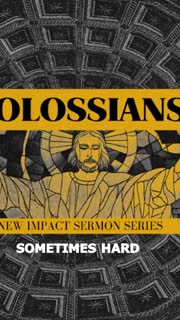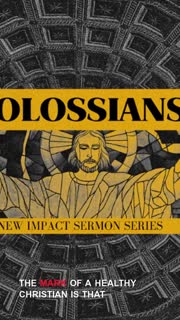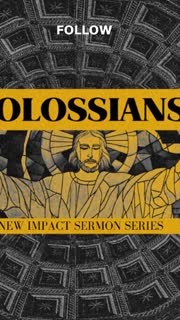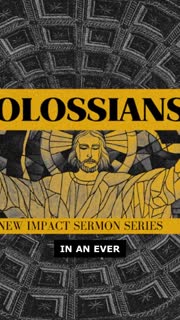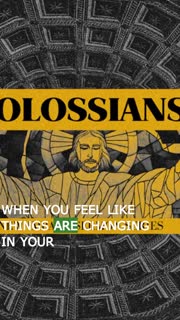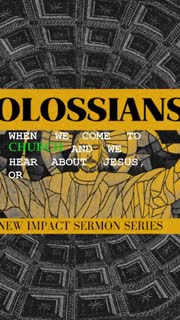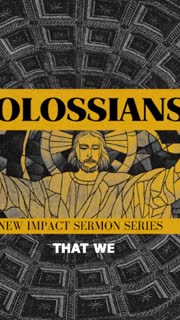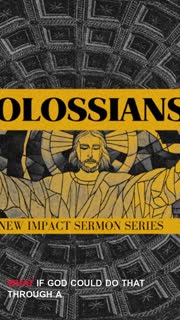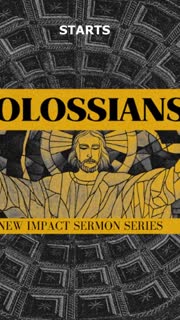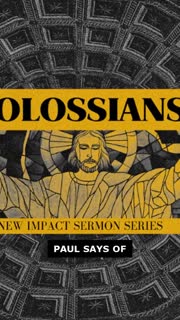Faith, Love, and Hope: Lessons from Colossians
Devotional
Sermon Summary
Bible Study Guide
Sermon Clips
1. "Sometimes hard things happen to us and God is still going to use it for his glory and for our good. And so Paul is saying, my name is Paul. I'm writing to you and I'm by the will of God. And I'm writing to you and I'm writing to you and I'm writing to you because God is good and God is in control. I'm in chains. Guys, Paul did not equate the goodness of God with his circumstances. He said, my circumstances may be bleak, but God is still good." [08:45] (33 seconds)
2. "The mark of a healthy Christian is that you're able to love someone that you disagree with. The mark of a healthy church is that there is love among the people because Jesus matters more than anything else that may divide us. The mark of spiritual health in a church is that our love for Jesus and our love for other people who follow Jesus is supreme over anything else in our lives." [19:56] (34 seconds)
3. "When we follow Jesus, the best is always yet to come. Here's why I believe that. Because heaven is to come. And so I don't know what may happen over the next 50 years on this earth, but I know that if you're a Christian, if you follow Jesus, if you're in a relationship with God, your future is heaven. And heaven, I don't need you to think, oh, heaven kind of weirds me out because I don't like heights and it's kind of weird. And I don't know. No, listen, heaven's not about the physical location. Heaven is about being in the presence of an almighty, loving, powerful God." [23:04] (41 seconds)
4. "In an ever changing world, we need a never changing truth. And listen to me, this world is changing all the time. Guys, listen, I'm still in my thirties and I'm already done with technology. I'm like, I'm just not going to learn another app. I'm going to become my grandfather. And, uh, well, from now on, I will allow my children to teach me, um, anything else that I need. And probably in the next five years, we're looking at a situation where Zeke is showing me how to find my email on my, on my phone. Like that's where we're headed right now. Okay. Listen, the world is changing so quickly, but God's truth has never changed." [27:35] (44 seconds)
5. "When you feel like things are changing in your life so quickly that you feel like you can't get a firm grasp, you're like, Oh man, I, I, I started middle school. I started high school. I started college and now I've got new friends and I'm starting a new job. And now maybe I've had a career change or just moved to the area and I've had a city change or I'm starting a family. And you just feel like there is so much change around you. Listen to me in an ever changing world. We need a never changing truth. And God has given us that. And it is called everybody say gospel. It's called the gospel." [27:35] (43 seconds)
6. "When we come to church and we hear about Jesus, or someone shares the message of Jesus to you, you don't sit back and go, yeah, yeah, I heard that at church. I knew that. Oh yeah. I went to a Christian school already, already knew that. Instead, we should sit back and go, that's the best news ever. That's amazing. It just feels like all these shackles just fell. It feels like I was in the anxieties of war and now the war is over. It is complete. And I won, but I didn't even fight, but I won. And guys, that is good news." [30:24] (32 seconds)
7. "The reason we take communion every week is because every week we need to be reminded that we send, but God provides and Jesus gives and we respond. I need that reminder every week. I need that reminder every single week. And you do too. And so let's never be a church that moves on from the gospel. Instead, let's be a church that lets the gospel grow deep roots in our lives and then increases it and multiplies it to hard places like Syria and Iraq and Iran and Afghanistan and Egypt and North Korea." [45:40] (39 seconds)
8. "What if God could do that through a small two and a half year old church plant in a suburb of Washington, D.C. And that from there, God could do that. And that from there, God could do that. And that from there, from the small beginnings of a church, the gospel would grow roots in our lives and would spread to people of every nation, every language and every tribe. What if I told you it already happened?" [41:40] (34 seconds)
9. "Paul starts his letter with thanksgiving. And guys, when we follow Jesus, that's how we can live our lives is with thanksgiving. And so that's what we see. Paul is giving thanks to God, even though he's never met them. Isn't that amazing? Never met these people, never been to their town, but he's saying, man, I want to thank God for you." [13:43] (29 seconds)
10. "Paul says of this, you have heard before in the word of the truth, the gospel. I don't want you to, I want you to write this down, but the truth is the gospel. And I feel like I need to say this in our world today and in our culture. So forgive me if it sounds elementary, if you're like, oh, Brandon, that's so simple. I'm not going to write this down. I'm not going to write that down, but just humor me. Cause I feel like in, in our culture today, I need to say this. There is truth." [26:01] (25 seconds)
Ask a question about this sermon
2. "The mark of a healthy Christian is that you're able to love someone that you disagree with. The mark of a healthy church is that there is love among the people because Jesus matters more than anything else that may divide us. The mark of spiritual health in a church is that our love for Jesus and our love for other people who follow Jesus is supreme over anything else in our lives." [19:56] (34 seconds)
3. "When we follow Jesus, the best is always yet to come. Here's why I believe that. Because heaven is to come. And so I don't know what may happen over the next 50 years on this earth, but I know that if you're a Christian, if you follow Jesus, if you're in a relationship with God, your future is heaven. And heaven, I don't need you to think, oh, heaven kind of weirds me out because I don't like heights and it's kind of weird. And I don't know. No, listen, heaven's not about the physical location. Heaven is about being in the presence of an almighty, loving, powerful God." [23:04] (41 seconds)
4. "In an ever changing world, we need a never changing truth. And listen to me, this world is changing all the time. Guys, listen, I'm still in my thirties and I'm already done with technology. I'm like, I'm just not going to learn another app. I'm going to become my grandfather. And, uh, well, from now on, I will allow my children to teach me, um, anything else that I need. And probably in the next five years, we're looking at a situation where Zeke is showing me how to find my email on my, on my phone. Like that's where we're headed right now. Okay. Listen, the world is changing so quickly, but God's truth has never changed." [27:35] (44 seconds)
5. "When you feel like things are changing in your life so quickly that you feel like you can't get a firm grasp, you're like, Oh man, I, I, I started middle school. I started high school. I started college and now I've got new friends and I'm starting a new job. And now maybe I've had a career change or just moved to the area and I've had a city change or I'm starting a family. And you just feel like there is so much change around you. Listen to me in an ever changing world. We need a never changing truth. And God has given us that. And it is called everybody say gospel. It's called the gospel." [27:35] (43 seconds)
6. "When we come to church and we hear about Jesus, or someone shares the message of Jesus to you, you don't sit back and go, yeah, yeah, I heard that at church. I knew that. Oh yeah. I went to a Christian school already, already knew that. Instead, we should sit back and go, that's the best news ever. That's amazing. It just feels like all these shackles just fell. It feels like I was in the anxieties of war and now the war is over. It is complete. And I won, but I didn't even fight, but I won. And guys, that is good news." [30:24] (32 seconds)
7. "The reason we take communion every week is because every week we need to be reminded that we send, but God provides and Jesus gives and we respond. I need that reminder every week. I need that reminder every single week. And you do too. And so let's never be a church that moves on from the gospel. Instead, let's be a church that lets the gospel grow deep roots in our lives and then increases it and multiplies it to hard places like Syria and Iraq and Iran and Afghanistan and Egypt and North Korea." [45:40] (39 seconds)
8. "What if God could do that through a small two and a half year old church plant in a suburb of Washington, D.C. And that from there, God could do that. And that from there, God could do that. And that from there, from the small beginnings of a church, the gospel would grow roots in our lives and would spread to people of every nation, every language and every tribe. What if I told you it already happened?" [41:40] (34 seconds)
9. "Paul starts his letter with thanksgiving. And guys, when we follow Jesus, that's how we can live our lives is with thanksgiving. And so that's what we see. Paul is giving thanks to God, even though he's never met them. Isn't that amazing? Never met these people, never been to their town, but he's saying, man, I want to thank God for you." [13:43] (29 seconds)
10. "Paul says of this, you have heard before in the word of the truth, the gospel. I don't want you to, I want you to write this down, but the truth is the gospel. And I feel like I need to say this in our world today and in our culture. So forgive me if it sounds elementary, if you're like, oh, Brandon, that's so simple. I'm not going to write this down. I'm not going to write that down, but just humor me. Cause I feel like in, in our culture today, I need to say this. There is truth." [26:01] (25 seconds)
